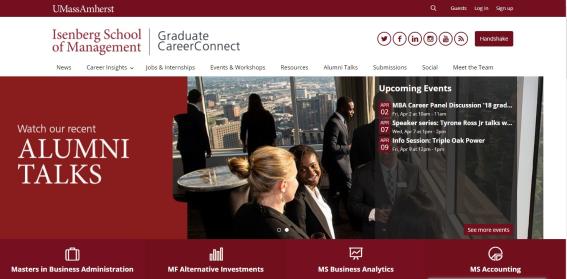Finance Grad Brings Online Career Platform to Isenberg
March 31, 2021

Kozhuk’s initial market survey a decade ago revealed that career services were underutilized. Students, he found, were not sufficiently engaged. How do we turn that around? he pondered. “As a student at Isenberg, the Chase Career Center was extremely valuable to me,” he recalls. “But I was particularly motivated. I made the most of what seemed like every career services resource, and not every student fits that profile.” Kozhuk, in fact, secured three internships as a financial analyst as a student. (After graduation, he worked as an analyst with Arctaris Capital Partners in Boston before founding uConnect in 2014.)
Engaging students in career services is the key to reversing resource underutilization, he emphasizes. You have to make resources accessible 24/7. That, in turn, requires a virtual interface tailored to student priorities and their school’s identity and culture. Graduate Career Connect, Isenberg’s own career services site for its master’s degree students, delivers all of those assets and more. Designed by uConnect, its articulate menu of services offers one-stop shopping for career strategies and goals.
The menu includes separate sections for events and workshops, alumni talks, and the all-important posting of jobs and internships. (At this writing, students could explore 200+ of them via the website.) It also offers a wealth of resources that give students an edge in interviewing, networking (alumni networks included), entrepreneurship, job searches, and deployment of LinkedIn, Glassdoor, Salary.com, and other online assets.
“uConnect has really changed the way career centers ‘stack’ their resources,” says Kim Figueroa, Isenberg’s director of internships. “I have been incredibly impressed with the growth of uConnect and with its rising stature as a thought leader in higher ed career services.”
Kozhuk says Isenberg’s master’s degree programs have been great to work with. “The online MBA program is two decades old. Isenberg was way ahead of the curve in that marketplace and knows how to adapt. It has a well-earned comfort level with online education.” This spring, Isenberg will be expanding the use of uConnect, rolling out a digital career services space for all undergraduates, graduates, and alumni of Isenberg.
Isenberg Input
Before launching uConnect, Kozhuk spent two-and-a-half years researching his idea and its prospective market. That’s where advice from Figueroa made a difference. “As a graduate, I returned to Isenberg to recruit for Arctaris,” he recalls. “Kim was a strong advocate of technology in tracking student and alumni progress. She was extremely supportive of my idea, especially through her take on my prototype and my market research.”

Figueroa recalls having numerous conversations about how career information was presented back when Kozhuk was a student, as well as after he graduated. “While he still worked at Arctaris, he reached out to see if Chase would be willing to pilot his initial idea,” she says. “We agreed to this adventure and I was thrilled to be able to work with the early stage platform and provide real-time feedback for his team.”
During the research phase, Kozhuk visited 150 schools on the East Coast and found that students, across the board, weren’t as engaged as they could be with career offerings. “After that, I joined an accelerator program in Boston called LearnLaunch, dedicated to educational technology. As a first-time entrepreneur, I had no idea what I was getting into, and the accelerator was key to getting the business off the ground.”
To date, uConnect has relied on institutional investors for most of its capital. “Our goal is to turn profitable next year,” Kozhuk says. During the pandemic, demand for the company’s services has soared. “We’ve grown by 50 percent over the past year,” he observes. “Our team of twenty includes employees in three main areas—product development/engineering, sales and marketing, and customer success.” Kozhuk is confident that demand for uConnect will prove sustainable following the pandemic. “uConnect is at the intersection of education and work. And career services are the driver for growth in higher education. Facilitating lifelong learning will be critical for business success and professional mobility. People will enroll and re-enroll in higher ed throughout their lives and careers, focused on learning that leads to earning, and we’ll never go back.”